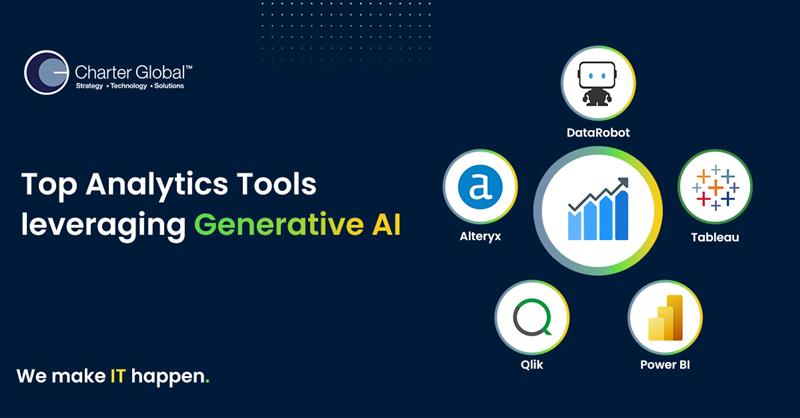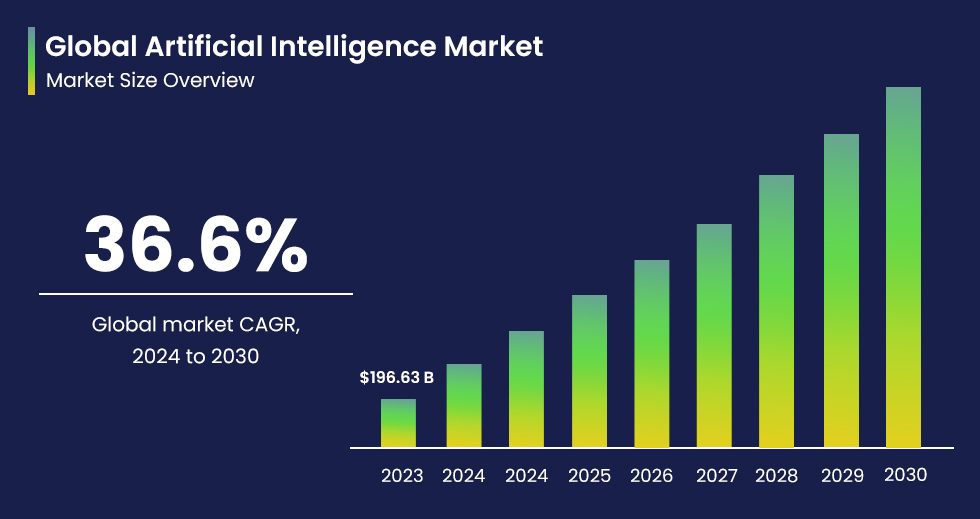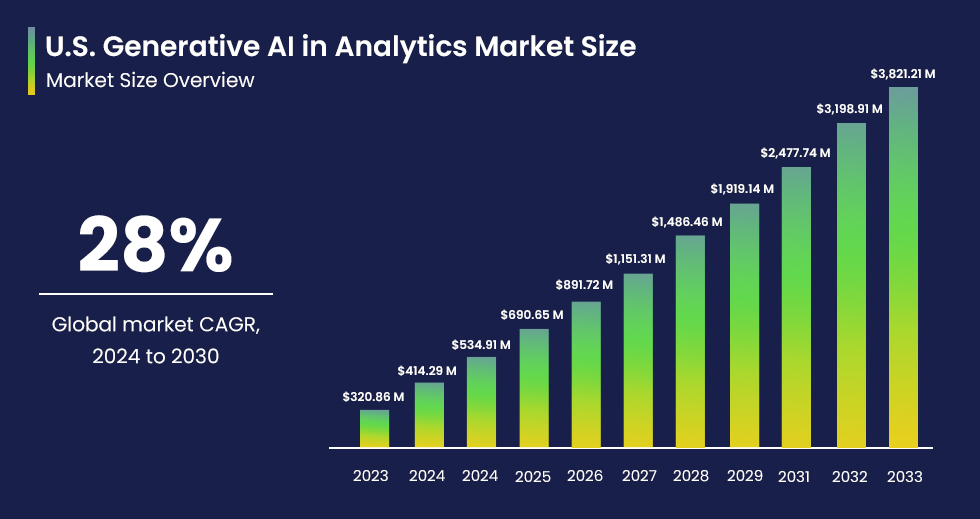In the past few years, the field of analytics has undergone a revolutionary transformation, thanks to the emergence of generative artificial intelligence (AI) services. This powerful technology has the potential to revolutionize how we collect, analyze, and interpret data, unlocking unprecedented insights and driving innovation across various industries.
By leveraging generative AI services, businesses can now automate data preparation tasks, generate synthetic data for testing and experimentation, and even create entirely new data points. This opens up a world of possibilities, from improving customer experiences to optimizing operations and making more informed decisions.

Understanding Generative AI in Analytics
Generative AI Services refers to a type of artificial intelligence that can generate new content, such as text, images, or audio, based on existing data. In the context of analytics, generative AI can be used to:
- Improve data understanding: By generating synthetic data, businesses can gain a deeper understanding of their data and identify patterns that might be difficult to detect with real-world data alone.
- Accelerate insights: Generative AI can automate data preparation and analysis tasks, allowing businesses to obtain insights more quickly and efficiently.
- Enhance decision-making: By generating predictive models and forecasts, generative AI can help businesses make more informed decisions and anticipate future trends.
Some common applications of generative AI in analytics
- Customer segmentation: Identifying distinct groups of customers based on their behaviors and preferences.
- Predictive modeling: Forecasting future trends and outcomes.
- Anomaly detection: Identifying unusual or unexpected patterns in data.

Top 5 Analytics Tools Leveraging Generative AI
Here are the top 5 analytics tools that are making significant strides in utilizing generative AI:
1. DataRobot: A Pioneer in Generative AI for Analytics
DataRobot is a leading automated machine learning platform that leverages generative AI to revolutionize the way businesses extract value from their data. Here’s a detailed look at how DataRobot utilizes generative AI:
Synthetic Data Generation
- Data Augmentation: DataRobot can generate synthetic data to augment training datasets, especially when dealing with limited or imbalanced data. This helps improve model performance and generalizability.
- Privacy Preservation: Synthetic data can be used to protect sensitive information while still providing valuable insights. By replacing real data with synthetic equivalents, businesses can maintain data privacy and compliance.
Automated Machine Learning
- End-to-End Automation: DataRobot automates the entire machine learning process, from data preparation to model deployment. This reduces the need for specialized data science skills and accelerates time-to-value.
- Model Selection and Optimization: Generative AI is used to efficiently explore and select the best machine learning models for a given task. DataRobot can also automatically optimize model hyperparameters to achieve optimal performance.
Model Explainability
- Understanding Model Decisions: DataRobot provides tools to explain the decisions made by machine learning models. This helps businesses understand how models arrived at their conclusions and build trust in their results.
- Bias Detection: Generative AI can be used to identify and mitigate biases within machine learning models, ensuring fairness and equity in decision-making.
Automated Feature Engineering
- Feature Creation: DataRobot can automatically create new features from existing data, improving model performance and extracting valuable insights. Generative AI is used to identify relevant feature combinations and transformations.
2. Tableau: Enhancing Analytics with Generative AI
Tableau, a leading business intelligence and data visualization tool, has integrated generative AI to enhance its capabilities. Here’s how generative AI is being utilized in Tableau:
Automated Insights
- Natural Language Processing: Tableau can understand natural language queries, allowing users to ask questions about their data in plain English.
- Insight Generation: The tool can automatically generate insights and recommendations based on the data, saving time and effort for analysts.
Predictive Analytics
- Model Creation: Tableau can leverage machine learning to create predictive models, forecasting future trends and outcomes.
- AI-Driven Recommendations: The tool can recommend appropriate predictive models based on the data and the desired outcome.
Natural Language Processing
- Query Understanding: Tableau can understand natural language queries, making it easier for users to explore and analyze data.
- Data Exploration: Users can ask questions about their data in plain English, and Tableau will provide relevant visualizations and insights.
3. Power BI: Leveraging Generative AI for Enhanced Analytics
Power BI, another popular business intelligence tool, has also embraced generative AI to enhance its capabilities. Here’s how generative AI is being used in Power BI:
Automated Data Preparation
- Data Cleaning and Transformation: Power BI can automatically clean, transform, and prepare data for analysis, reducing manual effort and errors.
- Data Quality Assessment: Generative AI can help identify and address data quality issues, ensuring the accuracy and reliability of your data.
AI-Powered Visualizations
- Visualization Recommendations: Power BI can suggest appropriate visualizations based on your data, making it easier to create compelling and informative reports.
- Automated Insights: Generative AI can help identify trends, patterns, and anomalies within your data, providing valuable insights.
Predictive Analytics
- Model Building and Deployment: Power BI offers built-in predictive modeling capabilities, allowing you to forecast future trends and outcomes.
- Model Management: Generative AI can help manage and optimize predictive models, ensuring they remain relevant and effective.
4. Qlik: Empowering Data Discovery with Generative AI
Qlik, a leading data discovery and visualization platform, has integrated generative AI to enhance its capabilities. Here’s how generative AI is being used in Qlik:
Automated Data Discovery
- Pattern Identification: Qlik can automatically identify patterns and relationships within your data, even in complex datasets.
- Insight Generation: Generative AI helps Qlik uncover hidden insights and trends that might be difficult to detect manually.
Natural Language Processing
- Query Understanding: Qlik can understand natural language queries, making it easier for users to explore and analyze data.
- Data Exploration: Users can ask questions about their data in plain English, and Qlik will provide relevant visualizations and insights.
Predictive Analytics
- Model Building and Deployment: Qlik offers built-in predictive modeling capabilities, allowing you to forecast future trends and outcomes.
- Model Optimization: Generative AI can help optimize predictive models to improve their accuracy and performance.
5. Alteryx: Automating Analytics with Generative AI
Alteryx, a leading data analytics platform, has integrated generative AI to enhance its capabilities. Here’s how generative AI is being used in Alteryx:
Automated Data Preparation
- Data Cleaning and Transformation: Alteryx can automatically clean, transform, and prepare data for analysis, reducing manual effort and errors.
- Data Quality Assessment: Generative AI can help identify and address data quality issues, ensuring the accuracy and reliability of your data.
Automated Machine Learning
- Model Building and Deployment: Alteryx can automatically build and deploy machine learning models, simplifying the machine learning process.
- Model Optimization: Generative AI can help optimize machine learning models to improve their performance and accuracy.
Predictive Analytics
- Forecasting and Prediction: Alteryx can use predictive models to forecast future trends and outcomes, enabling businesses to make informed decisions.
- Scenario Planning: Generative AI can help create and analyze different scenarios, providing valuable insights into potential outcomes.

Considerations and Best Practices
When choosing a generative AI tool for analytics, it’s essential to consider the following factors:
- Your specific needs: What kind of insights are you trying to gain from your data? Do you need to automate data preparation, create predictive models, or identify anomalies?
- Budget: Different tools have varying pricing models, so it’s important to consider your budget and choose a tool that fits within your financial constraints.
- Technical expertise: Some tools may require more technical expertise than others. If you’re not familiar with data science or machine learning, you may want to choose a tool with a more user-friendly interface.
In addition to these factors, it’s also important to be aware of the ethical implications of using generative AI in analytics. For example, it’s crucial to ensure that the data you’re using is unbiased and representative of the population you’re trying to study. Additionally, you should be transparent about your use of generative AI and avoid making claims that are not supported by the data.
Finally, it’s important to stay up-to-date on the latest trends and advancements in generative AI for analytics. As the technology continues to evolve, new tools and capabilities will emerge, offering even greater opportunities for businesses to extract value from their data.
Gartner predicts that by 2026, more than 80% of businesses will use Generative Al technology. This is a significant increase from less than 5% in 2023.
Conclusion
Generative AI Services is revolutionizing the field of analytics, offering businesses unprecedented opportunities to extract value from their data. By automating tasks, enhancing data exploration, and providing valuable insights, generative AI is empowering businesses to make more informed decisions and gain a competitive edge.
The tools discussed in this blog represent just a glimpse of the innovative applications of generative AI in analytics. As the technology continues to evolve, we can expect to see even more exciting developments and advancements in this field. By staying informed about the latest trends and exploring the available tools, businesses can harness the power of generative AI to drive innovation and success.
Want to learn more about how generative AI can transform your business? Charter Global offers a wide range of services to help you leverage the power of AI for your analytics needs. From data preparation and modeling to AI-driven insights and predictive analytics, our experts can guide you every step of the way.
Contact us today to schedule a consultation and discover how Charter Global can help you leverage the full potential of generative AI for your business.
Or mail us at info@charterglobal.com or call +1 770 326 9933


